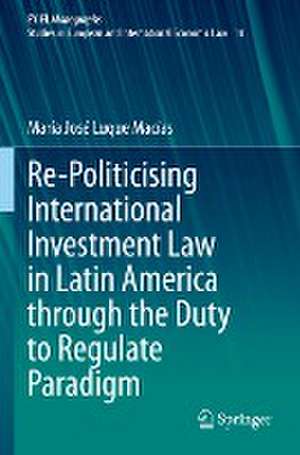Re-Politicising International Investment Law in Latin America through the Duty to Regulate Paradigm: European Yearbook of International Economic Law, cartea 14
Autor María José Luque Macíasen Limba Engleză Paperback – 24 mai 2022
| Toate formatele și edițiile | Preț | Express |
|---|---|---|
| Paperback (1) | 944.82 lei 6-8 săpt. | |
| Springer International Publishing – 24 mai 2022 | 944.82 lei 6-8 săpt. | |
| Hardback (1) | 950.96 lei 6-8 săpt. | |
| Springer International Publishing – 23 mai 2021 | 950.96 lei 6-8 săpt. |
Din seria European Yearbook of International Economic Law
- 20%
 Preț: 752.66 lei
Preț: 752.66 lei - 24%
 Preț: 693.81 lei
Preț: 693.81 lei -
 Preț: 283.98 lei
Preț: 283.98 lei - 24%
 Preț: 789.00 lei
Preț: 789.00 lei -
 Preț: 345.33 lei
Preț: 345.33 lei - 20%
 Preț: 676.85 lei
Preț: 676.85 lei - 18%
 Preț: 885.63 lei
Preț: 885.63 lei - 18%
 Preț: 946.72 lei
Preț: 946.72 lei - 18%
 Preț: 1117.50 lei
Preț: 1117.50 lei - 18%
 Preț: 1113.39 lei
Preț: 1113.39 lei - 18%
 Preț: 886.92 lei
Preț: 886.92 lei - 18%
 Preț: 998.82 lei
Preț: 998.82 lei - 20%
 Preț: 582.81 lei
Preț: 582.81 lei - 18%
 Preț: 883.75 lei
Preț: 883.75 lei - 18%
 Preț: 888.95 lei
Preț: 888.95 lei - 18%
 Preț: 776.72 lei
Preț: 776.72 lei - 18%
 Preț: 780.68 lei
Preț: 780.68 lei - 18%
 Preț: 966.27 lei
Preț: 966.27 lei - 18%
 Preț: 1115.46 lei
Preț: 1115.46 lei - 18%
 Preț: 780.06 lei
Preț: 780.06 lei -
 Preț: 384.86 lei
Preț: 384.86 lei - 24%
 Preț: 842.42 lei
Preț: 842.42 lei - 18%
 Preț: 943.43 lei
Preț: 943.43 lei - 18%
 Preț: 962.98 lei
Preț: 962.98 lei - 18%
 Preț: 781.94 lei
Preț: 781.94 lei - 24%
 Preț: 830.77 lei
Preț: 830.77 lei - 24%
 Preț: 814.75 lei
Preț: 814.75 lei - 18%
 Preț: 938.04 lei
Preț: 938.04 lei - 18%
 Preț: 956.03 lei
Preț: 956.03 lei - 18%
 Preț: 779.89 lei
Preț: 779.89 lei -
 Preț: 423.84 lei
Preț: 423.84 lei - 18%
 Preț: 1126.35 lei
Preț: 1126.35 lei - 24%
 Preț: 778.28 lei
Preț: 778.28 lei
Preț: 944.82 lei
Preț vechi: 1152.22 lei
-18% Nou
Puncte Express: 1417
Preț estimativ în valută:
180.79€ • 188.76$ • 149.63£
180.79€ • 188.76$ • 149.63£
Carte tipărită la comandă
Livrare economică 04-18 aprilie
Preluare comenzi: 021 569.72.76
Specificații
ISBN-13: 9783030732745
ISBN-10: 3030732746
Pagini: 285
Ilustrații: XV, 285 p. 1 illus.
Dimensiuni: 155 x 235 mm
Greutate: 0.43 kg
Ediția:1st ed. 2021
Editura: Springer International Publishing
Colecția Springer
Seriile European Yearbook of International Economic Law, EYIEL Monographs - Studies in European and International Economic Law
Locul publicării:Cham, Switzerland
ISBN-10: 3030732746
Pagini: 285
Ilustrații: XV, 285 p. 1 illus.
Dimensiuni: 155 x 235 mm
Greutate: 0.43 kg
Ediția:1st ed. 2021
Editura: Springer International Publishing
Colecția Springer
Seriile European Yearbook of International Economic Law, EYIEL Monographs - Studies in European and International Economic Law
Locul publicării:Cham, Switzerland
Cuprins
1 Introduction.- 2 The Politicisation of International Legal Instruments Protecting Foreign Investment in Latin America through States’ Articulation of Sovereign Rights.- 3 The States’ Duty to Regulate Foreign Investment Activities under IHRL as a Paradigm for Re-Politicising IIL.- 4 Re-politicisation of IIL by States through an Articulation of their Duty to Regulate in IIAs.- 5 Re-politicisation of IIL by a Regional ISDS Tribunal through its Engagement with Inter-Regime Tensions.- 6 Conclusions and Outlook.
Notă biografică
María José Luque Macías is an Ecuadorian lawyer (UCSG) and LL.M (Potsdam University) with research interests in international investment law, human rights law, and the business and human rights debate. After completion of her doctoral procedure in 2019, she has contributed to the Oxford International Organizations (OXIO) Project and investigated the implications of the recognition of a right to a healthy environment over the access to Inter-American human rights system as a post-doctoral researcher at the FAU Erlangen-Nürnberg.
Textul de pe ultima copertă
This book offers insights into how international investment law (IIL) has frustrated states’ protection of human rights in Latin America, and IIL has generally abstained from dealing with inter-regime frictions. In these circumstances, this study not only argues that IIL should be an object of contention and debate (‘politicisation’). It also contends that Latin American countries have traditionally been the frontrunners in the politicisation of international legal instruments protecting foreign investment, questioning whether the paradigms informing their claims’ articulation are adequate to frame this debate. It demonstrates that the so-called ‘right to regulate’ is the paradigm now prevalently used to challenge IIL, but that it is inadequate from a human rights perspective. Hence, the book calls for a re-politicisation of IIL in Latin America through a re-conceptualization of how states’ regulation of foreign investment is understood under international human rights law, which entails viewing it as an international duty. After determining what the ‘duty to regulate’ constitutes in relation to the right to water and indigenous peoples’ right to lands based on human rights doctrine, the book analyses the extent to which Latin American countries are currently re-politicising IIL through an articulation of this international duty, and arbitral tribunals’ responses to their argumentative strategies. Based on these findings, the book not only proposes investment treaties’ reform to anchor the ‘duty to regulate’ paradigm in IIL, and in the process, to induce tribunals’ engagement with human rights arguments when they come to underpin respondent states’ defences in investor-state dispute settlement (ISDS). In addition, drawing upon the (now likely defunct) idea of creating a regional ISDS tribunal, the book briefly reflects on options available to such a tribunal in terms of dealing with troubling normative/institutional interactions between regimes during ISDS proceedings.
Caracteristici
Presents an innovative study on the Latin America approach to international investment protection Draws on in-depth knowledge of international investment law and human rights law Puts forward normative and institutional avenues for re-politicising international investment law
